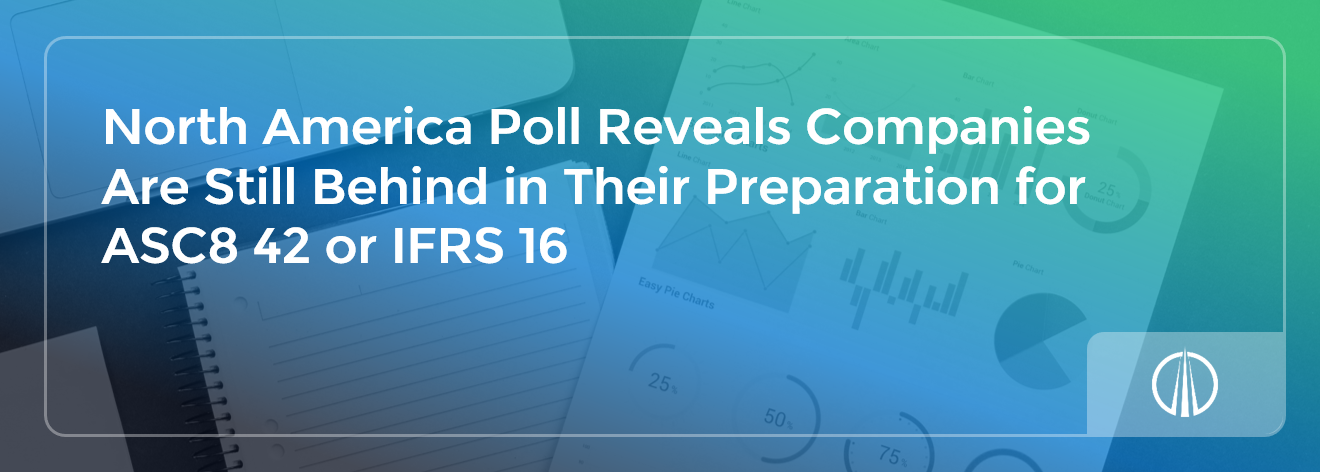North America Poll Reveals Companies Are Still Behind in Their Preparation for ASC 842 or IFRS 16
Updated 19th August 2021 | 9 min read Published 6th December 2018

Back in February 2016, The Financial Accounting Standards Board (FASB) issued an Accounting Standards Update (ASC 842) with the intention of improving on implementation the financial reporting of lease transactions whether the leasing of aircraft, property or equipment of any type – IT, copier, medical or manufacturing.
“The new guidance responds to requests from investors and other financial statement users for a more faithful representation of an organization’s leasing activities,” stated FASB Chair Russell G. Golden. It ends what the U.S. Securities and Exchange Commission and other stakeholders have identified as one of the largest forms of off-balance sheet accounting while requiring more disclosures related to leasing transactions.
Throughout the project by FASB and IASB, interested parties were consulted, briefed and involved particularly with regard to the role and impact of Lease Finance and the Financial implications of the changes proposed under ASC 842 and IFRS 16
May 2018 Poll Highlights:
Earlier this year as a result of analysing a poll of North American companies by Robert Half and Protiviti, Innervision Director, Martin Kennard was able to surmise that “Despite the inclusive and open nature of the drafting, consultation on, and issuance of the new accounting standards the world of Finance will need to dramatically speed up its acceptance and implementation of their selected regulation if the deadline of 1st January 2019 is to be met”.
This earlier poll highlighted two key areas of concern
- Internal skills shortage
- Failure to begin to seriously assess the work involved
"Companies cannot underestimate the amount of work required for the new lease accounting standard," said Tim Hird, executive director of Robert Half Management Resources. "Firms that haven't started risk being in catch-up mode the moment they do and scrambling to find experienced professionals who can quickly step in to help organizations meet the new guidance."
Hird added, "Staffing lease accounting initiatives often proves difficult for organizations. Because the guidance is still relatively new, many companies lack the necessary expertise. In response, businesses are working with outside consultants and interim professionals, either to access the requisite skills or to help cover day-to-day accounting needs left open by full-time employees taking on lease work."
Your business may be well prepared, well-staffed and well on the way to compliance but regardless of that you will want to see how you are doing against the trends and how other businesses are looking to meet compliance deadlines
Analysing a more recent poll published in October 2018 will evidence how these areas have or have not now been addressed.
Oct 2018 Poll Highlights:
“only 43% of public companies are in the final implementation stage of deploying a tool and migrating data “– Accounting Today, October 2018.
More recent surveys and Accounting Today both quote figures that suggest that businesses are behind the curve when it comes to compliance planning and preparation let alone transition. At the end of October, Accounting Today led with an article reminding its readership “deadline approaching for lease accounting changes” and publishing a statistic that “only 43% of public companies are in the final implementation stage of deploying a tool and migrating data “.
Of just as much concern now is the fact that in this more recent poll, again taken across private and public companies in North America, some 42% of respondents answered that they were “still in the early stages of implementing the new standards”. More than 100 responses were received, and the indications show that while Public Companies may be ahead of others overall, they too are behind.
As Public Companies tend to be larger and their lease portfolios often reflect this, it is understandable that they have been more proactive and taken notice of and tried to grasp the complexities of transition to the new standards.
The poll results further suggested that any company in the very early stages of preparation or any company that had failed to even begin to prepare was more likely to underestimate those complexities! Having said that it needs to be noted that almost 60% of companies viewed the transition process as likely to be somewhat difficult while just 9% thought it “not difficult”. The other respondents viewed the work as at least difficult and 10% of the total thought it very difficult which given time and resource together with complexity may be the realistic view.
A look at the planned deployment of resources again demonstrated how too many businesses may be underestimating the work involved and not taking heed of the now tight timescales. Proof of this if needed, is that more than 45% of those polled were planning to allocate just one or two employees to the compliance project. Whether a business has half a dozen leases, hundreds of leases or thousands the preparation and training are likely to be similar. Once a process is established then the workload becomes more routine. That process may need to be more sophisticated than a set of spreadsheets and will, likely require financial investment in outside resource, software or both.
The poll evidenced that the concerns and challenges of those at and beyond the planning stage were in order of importance:
- Understanding the new standards (published in Jan 2016)
- Tight timeline (accounting periods from Jan 2019)
- Under-resourcing of dedicated personnel (are they lease savvy?)
- Number of leases affected (where are they, who had paperwork, are they current etc.?)
- Lack of applicable tools (purpose developed software solutions are available see below)
- Lack of budget (the transition needs to happen, and compliance is worth the investment)
Asking the various heads of accounts “what would help?” - their wish list included:
- Clarification of the new standards – ask a specialist such as Innervision or your auditors
- Time-saving tips – how do you know if you have all leases? How can you reclassify them?
- Best practices – again ask someone who has done it many times – Innervision
How does YOUR business line up against the rest?
Looking at just where business entities are in the journey to compliance the poll was able to report that across the board:
- 13% had project initiated (roles assigned, plan and budget in place)
- 29% were in the early stages of assessing an implementation plan
- 23% were now collecting, collating and consolidating their lease data the process of
- 10% were evaluating or selecting a purpose developed tool (software such as LOIS Lease Accounting 'LLA')
- 25% were deploying tools, migrating data and on the road to meeting the deadline
How to be in the top 25% (answer to all questions at foot of blog)
Is there resource available to take on this transition? Autonomous and skilled?
Is there time to attain compliance under ASC 842 and/or IFRS 16? With the deadline for implementation fast approaching the need for complete and centralised data is never more key. If the 1st January 2019 deadline is to be met, companies should already be well on their way to understanding what leases are impacted and should have, at a minimum, started collating the relevant lease information on a centralised data repository.
So how many leases does your company have? According to the October survey, some 60% of public companies had more than 100 leases – 12% of all companies had more than a thousand!
Where are the assets and where are the contracts?
Whilst it is still possible for companies to make adequate adjustments and implement the relevant processes, systems and controls required to ensure full compliance, companies should ideally be further along in their preparations if they are to give themselves enough time to make astute transition decisions that are in the best interests of their business.
The longer companies delay their implementation preparation, the fewer choices they will have surrounding certain accounting policy elections, available expedients and judgements.
-
Transitioning to the new lease accounting standard, sadly, isn’t just as simple as bringing all off-balance sheet lease commitments (currently likely to be operating lease footnote disclosures) onto the balance sheet.
In an effort to support a successful transition to the new accounting standard, whether FASB or IASB and to simplify compliance with IFRS 16 or ASC 842 many organisations will need to evaluate and review the suitability of any existing lease accounting systems and processes. To accelerate the transition, they may also consider implementing new systems that allow them to automate elements of the lease accounting process that currently may be managed manually on antiquated applications such as spreadsheets.
Is there further evidence of unpreparedness? – the surveys both suggest strongly that there is!
Summary
The May survey was larger, but the October survey was just as targeted and reveals that there has been progress by most business sectors in most areas of transition to compliance, but the Accounting Toady headlines tell us that there is still some way to go. The areas of concern remain the same – skill and time! The interesting statistic is that the journey seems to have the “happiest” ending as companies allocate budget and resource to utilise a third-party software solution. There is not sufficient time for installing and testing applications and so companies need to look for a cloud-based, secure, well-proven, purpose developed solution form a reputable supplier.
How Lease Accounting Software Will Help
When transitioning to IFRS 16 the top 4 auditors are recommending that companies consider the adoption and deployment of appropriate lease accounting systems that will help simplify the implementation of either IFRS 16 or FASB ACS 842.
"Following the release of both new lease accounting standards, it’s clear that creating a centralised, electronic repository of all equipment and real estate leases held should be a priority for companies with leased assets."
Sean Torr, Advisory Managing Director and Lease Accounting Services Leader:
Deloitte
LOIS - Lease Accounting, by Innervision
LOIS - Lease Accounting is a cloud-based accounting solution that delivers all the transition tools and functionality needed to extract, validate and report on all the critical lease data required for full compliance with both IFRS 16 and FASB ASC 842. Classification of leases, setting of discount rates, change management and companies that use LOIS to manage and enhance their lease portfolio are able to produce all the accounting information required to accurately complete the financial statements obligatory for compliance; including income statement, cash flow and balance sheet. LOIS will also generate the complex accounting calculations for you.
For the Answer to the questions above and to all your concerns see - 7 Steps to Lease Accounting Compliance
For further guidance on implementing the new lease accounting standards, we have put together this inclusive guide to transitioning to the new standards – IFRS 16 or FASB ASC 842. Just follow the link below to access the guide.
Disclaimer: this article contains general information about the new lease accounting standards only and should NOT be viewed in any way as professional advice or service. The Publisher will not be responsible for any losses or damages of any kind incurred by the reader whether directly or indirectly arising from the use of the information found within this article.







